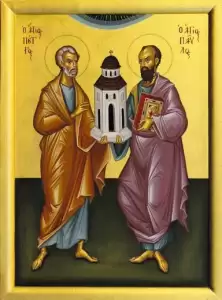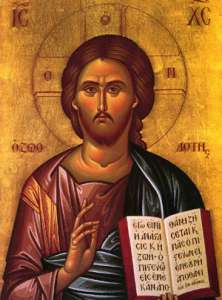Warning: Undefined array key "margin_above" in /home/stscahvallejo/public_html/wp-content/plugins/ultimate-social-media-icons/libs/controllers/sfsiocns_OnPosts.php on line 652
Warning: Undefined array key "margin_below" in /home/stscahvallejo/public_html/wp-content/plugins/ultimate-social-media-icons/libs/controllers/sfsiocns_OnPosts.php on line 653
God doesn't ask anything from mankind but love.
St. Joseph the Hesychast
September, 2022
For Sunday, September 25
Sinners become Saints
by Fr. Ninos Oshaana
In the gospel reading for this Sunday, we have the beautiful story of our Lord and the miracle of the great catch of fish at Lake of Gennesaret (another name for the Sea of Galilee). Due to the large crowd that was there to listen to him, there was literally no where for Christ to stand. So our Lord gets into one of the boats that was there on the shore, From there, he preaches and teaches the people. Listening to him were also Simon Peter who owned the boat as well as the two brothers James and John, the sons of Zebedee.
Through the gracious and divine words proceeding from his mouth, our Lord must have converted the hearts of many of the people who stood there listening to him. But it was necessary for that same conversion to occur for the men who would become his disciples. He doesn't do this through preaching to them as he had with the people but by connecting with them through something that was very dear and familiar to them, what they spent their whole day and night doing: catching fish.
After asking Simon to take the boat out into the lake for a catch, Simon doesn't hesitate but rather displays the virtue of humility; lamenting about his recent failure: that he had failed to catch any fish after trying the whole night. In addition to humility, Simon also displays the virtue of obedience and trust in Christ, saying, "at your word I will let down the nets."
What happens next is a great miracle. The nets fill up with fish to such an extent that the nets begin to break and as they try to haul the fish into the boats, the weight is so great that the boats begin to sink!
Seeing this miracle, Simon is filled with compunction and falls down at Jesus' knees and says, "Depart from me, for I am a sinful man, O Lord." St. Cyril of Alexandria tells us what is going on in Peter's conscience at this moment, writing:
"For calling back to his consciousness the crimes he had committed, he is alarmed and trembles, and as being unclean, he believes it impossible he can receive Him who is clean, for he had learnt from the law to distinguish between what is defiled and holy.
These words of Simon Peter are his confession and they are also what save him. However, the english translation of Simon Peter's words doesn't quite capture his agony, fear and self-condemnation. The word translated as "depart" is ἔξελθε (exelthe) in Greek. The word can mean to get away quickly from something, to flee and get out. Such a word reveals the revulsion and disgust that Simon is feeling about himself while being in the presence of the pure and holy Lord. In the Aramaic text for this passage, the word is ܦܪܩ (pareg) which means to save, that is, Simon is telling Jesus to get away quickly and save yourself from me! It is as if Simon is so filled with compunction, humility and guilt for his sins that he worries he will contaminate Jesus with them. Christ is like a mirror and his purity and holiness reveal the depth of Simon Peter's sins.
But it is precisely because of Simon's humility, obedience, honest self-awareness and confession that he is saved. Christ calms his fear, assuring him that no matter how great a sinner he may be, he can and will also become the greatest of saints. St. Bede writes:
"But the Lord allays the fears of carnal men, that no one trembling at the consciousness of his guilt, or astonished at the innocence of others, might be afraid to undertake the journey of holiness."
Christ does not depart from Simon Peter but instead does the opposite and makes him his chief disciple who he will fill with faith, wisdom, courage, and the power of the Holy Spirit. Simon the sinner becomes Peter the saint. The boats and the great catch of fish symbolize the Church. Through Peter and the other disciples, Christ will catch the whole world into his net. That boat and that net is the Church, the ark of salvation.
What is needed from us is to be like Simon Peter. To have humility, obedience, self-knowledge, compunction and confession. Through these we become disciples of Christ and transfigured from sinners into saints.
 Epistle Reading
Epistle Reading
The reading is from St. Paul's Second Letter to the Corinthians 4:6-15
Brethren, it is the God who said, "Let light shine out of darkness," who has shone in our hearts to give the light of the knowledge of the glory of God in the face of Christ.
But we have this treasure in earthen vessels, to show that the transcendent power belongs to God and not to us. We are afflicted in every way, but not crushed; perplexed, but not driven to despair; persecuted, but not forsaken; struck down, but not destroyed; always carrying in the body the death of Jesus, so that the life of Jesus may also be manifested in our bodies. For while we live we are always being given up to death for Jesus' sake, so that the life of Jesus may be manifested in our mortal flesh. So death is at work in us, but life in you.
Since we have the same spirit of faith as he had who wrote, "I believed, and so I spoke," we too believe, and so we speak, knowing that he who raised the Lord Jesus will raise us also with Jesus and bring us with you into his presence. For it is all for your sake, so that as grace extends to more and more people it may increase thanksgiving, to the glory of God.
In this epistle reading, St. Paul describes the difficult life of being a follower and apostle of Jesus Christ. For preaching the gospel and trying to bring people to repentance and a life in Christ, St. Paul and the other apostles endured the most extreme afflictions in their bodies as well as their hearts and minds. He describes how even though they suffer so greatly, they are not defeated nor despairing nor forsaken nor destroyed. He marvels at the great power of God, the great treasure of the Holy Spirit, which they have within themselves and which is at work through them, even though by human and worldly standards they appear weak and foolish to others. But it is precisely through their struggle and afflictions that Christ is made known to others. Because their struggles increased their faith and this made their preaching bold and powerful, and allowed them to perform miracles in the name of Christ and ultimately brought many people to salvation.
Questions:
- What is the treasure that St. Paul is referring to? Do you and I have it as well? How did we receive it?
- How can we keep the treasure with us always? What is needed in order to do so?
 Gospel Reading
Gospel Reading
The Gospel According to Luke 5:1-11
At that time, as Jesus was standing by the lake of Gennesaret, he saw two boats by the lake; but the fishermen had gone out of them and were washing their nets. Getting into one of the boats, which was Simon's, he asked him to put out a little from the land. And he sat down and taught the people from the boat. And when he had ceased speaking, he said to Simon, "Put out into the deep and let down your nets for a catch." And Simon answered, "Master, we toiled all night and took nothing! But at your word I will let down the nets." And when they had done this, they enclosed a great shoal of fish; and as their nets were breaking, they beckoned to their partners in the other boat to come and help them. And they came and filled both the boats, so that they began to sink. But when Simon Peter saw it, he fell down at Jesus' knees, saying, "Depart from me, for I am a sinful man, O Lord." For he was astonished, and all who were with him, at the catch of fish which they had taken; and so also were James and John, sons of Zebedee, who were partners with Simon. And Jesus said to Simon, "Do not be afraid; henceforth you will be catching men." And when they had brought their boats to land, they left everything and followed him.
Have you ever gone fishing? It can be an exciting time when the fish are biting and you're able to catch some. But when you stand there all day and catch nothing, it can be really frustrating and disappointing too. You never know what will happen when you go fishing. Sometimes you'll catch one fish and it will humble you. Another time you'll catch ten fish and it will make you prideful. Fishing is really unpredictable, just like our hearts.
Many of Christ's disciples were simple fishermen, as we read in the gospel reading. They worked all day in the blazing sun and sometimes even at night in order to catch fish that they could sell in the marketplace. Their lives relied not on their own ability but on whatever God would provide. They simply did their own part of putting in the work, without any guaranteed reward at the end of the day.
Christ could have chosen educated and wealthy men to be his disciples. But instead, what he wanted in a disciple he found in these fishermen. It was their simplicity, their diligence, their humility, their willingness to work hard that made them perfect to be disciples.
Questions:
- We are called to be Christ's disciples as well. What do we need to have? What does he require of us?
- How is fishing similar to the spiritual life?
![]() In peace let us pray to the Lord
In peace let us pray to the Lord
In our world today, we seek after peace. Instead we find division and strife, between people and between nations. But what is peace? For some it means feeling a calmness inside. For others it means being content and not harboring any resentment or anger towards anyone. While these may be various states of experiencing peace which are indeed important to acquire, they nonetheless depend largely on our external environment, circumstances and interactions which can change quite suddenly for the worse and then the peace we felt vanishes.
According to the teaching of the Church, true peace is something divine, one of the uncreated energies of God. It is not something that human beings can achieve but only something they can acquire as a gift from God. The condition required for receiving this gift of peace is repentance. A person who sees and acknowledges his or her sins and confesses them and struggles to repent and change, such a person is forgiven and helped by God and receives true and divine peace. On the contrary, the one who does not discern his or her sins and does not confess them, remains tormented spiritually, emotionally and psychologically by the memory of the sin and the associated guilt. Such a person can never have peace in this life or the next. Because our experience of the next life will largely be the same as our earthly life insofar as it depends on the condition of our soul and whether it had peace or not.
We are able to receive God's peace because of Jesus Christ. Through Christ, peace between human beings and God was restored. Mankind was lost, enslaved to sin and death before Christ came. But when God became a man; when he suffered for us and destroyed sin and death in his own flesh through the cross, resurrecting and ascending into heaven; the peace between mankind and God, which Adam and Eve had broken, was now restored. And all those who are joined to Christ through holy baptism and struggle in the spiritual life of repentance receive this peace as well.
After his resurrection from the dead, Christ appeared to his disciples, saying to them the greeting of "peace be upon you." This customary greeting of "peace be upon you" or Irini pasi in Greek, shalom aleichem in Hebrew, shlama alokhon in Aramaic, salam aleikom in Arabic, is still used in the holy land and middle-east to this day.
However, after the resurrection, that customary greeting took on an entirely new and spiritual meaning. The apostles were hiding in great fear behind locked doors. Suddenly, the risen Christ appears in their midst to calm their fears and fill them with peace and spiritual joy instead. His then blesses them and says "peace be upon you." Now his customary greeting meant something new. It was a proclamation of the peace between God and man, which Christ achieved on our behalf and which he gives to us through the Holy Spirit. He tells his disciples of the true and divine peace he gives to them which nothing and no one else can give:
“These things I have spoken to you while being present with you. But the Helper, the Holy Spirit, whom the Father will send in My name, He will teach you all things, and bring to your remembrance all things that I said to you. Peace I leave with you, My peace I give to you; not as the world gives do I give to you. Let not your heart be troubled, neither let it be afraid. (John 14:25-28)
In St. Paul's letter to the Romans, he points to this new relationship we have with God as well, writing:
Therefore, since we are justified by faith, we have peace with God through our Lord Jesus Christ. Through him we have obtained access to this grace in which we stand, and we rejoice in our hope of sharing the glory of God. (Romans 5:1-2)
And for us Orthodox Christians today the meaning of those words in the Divine Liturgy is also something beyond a cordial greeting. This peace is indeed the peace of God to those who believe in Christ and have the assurance of the forgiveness of sins and the hope of eternal life. It is a peace the world and those who do not have faith in Christ cannot understand or experience. We are also gathered together as the disciples were. We also have our own struggles, fears and troubles. But we are reminded with this first petition of the Divine Liturgy to remember and enter into the peace we have from Christ. In that and through that divine peace, we begin our prayer to the Lord.
After the first petition of "In peace, let us pray to the Lord," we sing the short prayer, "Lord, have mercy" or Kirie Eleison. The Greek word for mercy is eleison and it is based on the word έλαιο (elaiyo) which means oil. In the ancient world, oil was one of the primary medicinal remedies for healing wounds. In Aramaic, the word for mercy is rakhem, which can also mean to love. So the essence of our prayer, "Lord, have mercy" is that we are asking our Lord to forgive us our sins and to heal the wounds of our souls through his love.
Let's listen to and learn the shortest but most important prayer that we continually sing in the Divine Liturgy.
- Click the button below to download the sheet music.
- View or print out the sheet music.
- Click Track 3 - Lord have mercy below to listen to it chanted. Try to learn it and sing-along!
 St. Euphrosyne of Alexandria
St. Euphrosyne of Alexandria
Our venerable Mother Euphrosynē was born at the beginning of the fifth century in the city of Alexandria. She was the only child of illustrious and wealthy parents. When she was twelve years old, her mother reposed, and so the girl was raised by her Father, Paphnutios, who was a very devout Christian. He was in the habit of visiting a certain monastery, where the Igoumen was his Spiritual Father.
When Euphrosynē turned eighteen, her father wanted her to marry. He went to the monastery to obtain the Igoumen's blessing for his daughter's wedding. The Igoumen talked with her and gave her his blessing, but Saint Euphrosynē longed for the monastic life. One day, she gave away her possessions to the poor, and then she snuck out of the house.
The Saint had decided to enter a monastery in order to spend her life in solitude and prayer, but she was afraid that her father was apt to find find her in a women’s monastery. Therefore, she disguised herself as a man and entered the same men's monastery which she had visited with her father from her childhood, calling herself Smaragdos. The monks did not recognize Euphrosynē dressed in men’s clothes, and so they received her into the monastery. The monks were impressed by her spiritual struggles and by her willingness to serve everyone.
There in a solitary cell, Saint Euphrosynē spent 38 years in spiritual endeavors, fasting and prayer, thereby attaining a high level of spiritual accomplishment.
Paphnutios was deeply saddened by the loss of his beloved daughter; more than once, on the advice of his Spiritual Father, he spoke to the "monk" Smaragdos, disclosing his grief and receiving spiritual comfort. Before her death, Saint Euphrosynē revealed her secret to her grieving parent and insisted that no one but he should prepare her body for burial. After he buried his daughter, Paphnutios distributed all his wealth to the poor and to the monastery, and then he was tonsured. For ten years, until the time of his own repose, he labored in his daughter's cell.
By her life, Saint Euphrosynē reminds us that we must renounce "worldly passions and live soberly, uprightly, and devoutly" (Titus 2:12). That is, after rejecting the desires of this vain and sinful world, we ought to live abstemiously, with justice toward our fellow human beings, and with piety toward God.
Saint Paphnutios and his daughter Saint Euphrosynē are both also commemorated on February 15.
In Saint Euphrosyne we see an example of self-denial in a very unique way. She renounced the wealth of her father and what would have been a comfortable life. Instead, she chose to be a monastic, struggling in prayer and living in poverty. But even more astonishing, she chose to do this in a men's monastery which meant that she even denied herself the consolation and opportunities for friendship with other women. Striving to die to the world completely, she even changed her name.
Often times we hear the Church Fathers refer to "the world." What does "the world" mean? We read in John 3:16 that "God so loved the world, that he gave his only begotten Son so that whoever believes in Him should not perish but have eternal life." The "world" in this context means all of humanity and creation. However, when referring to the "world" with regard to the spiritual struggle and repentance, it means the passions: pride, anger, greed, lust, envy, gluttony, etc. The "world" can also mean anything that sets itself up in opposition to God in order to derail us from our true calling to know God. Clearly, this is the main task of the Devil, to lead us astray from God. When a person becomes "worldly" it means they have been deceived by the false happiness, materialism and seductive pleasures of this life as experienced through the body. This becomes their only desire to fullfill. They do not take care for their souls nor desire to walk the difficult and narrow path to the Kingdom of Heaven.
The right approach is to be in the world but not of the world. That means to live in the world without being enslaved by anything our life in the world offers us, e.g. health, wealth, beauty, fame, materialism, pleasure, etc. Instead, we strive to keep our hearts and minds free from this deception by being devoted to God and do our best to participate and experience these worldly things only as truly needed and in a modest and measured way. But the moment they become the only thing we live for, then we risk losing our true and eternal life in Christ.
Thank you for participating in SOFIA! If you've subscribed to our newsletter, look for an email notification next week when a new lesson page is posted. See you Sunday!

 Weekly catechism and spiritual devotion for the Orthodox home
Weekly catechism and spiritual devotion for the Orthodox home